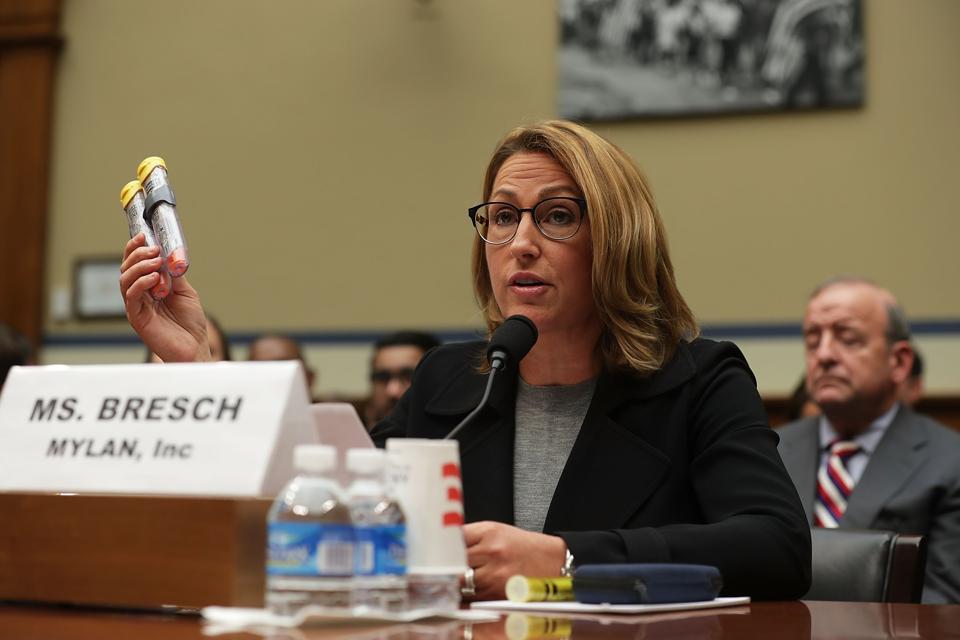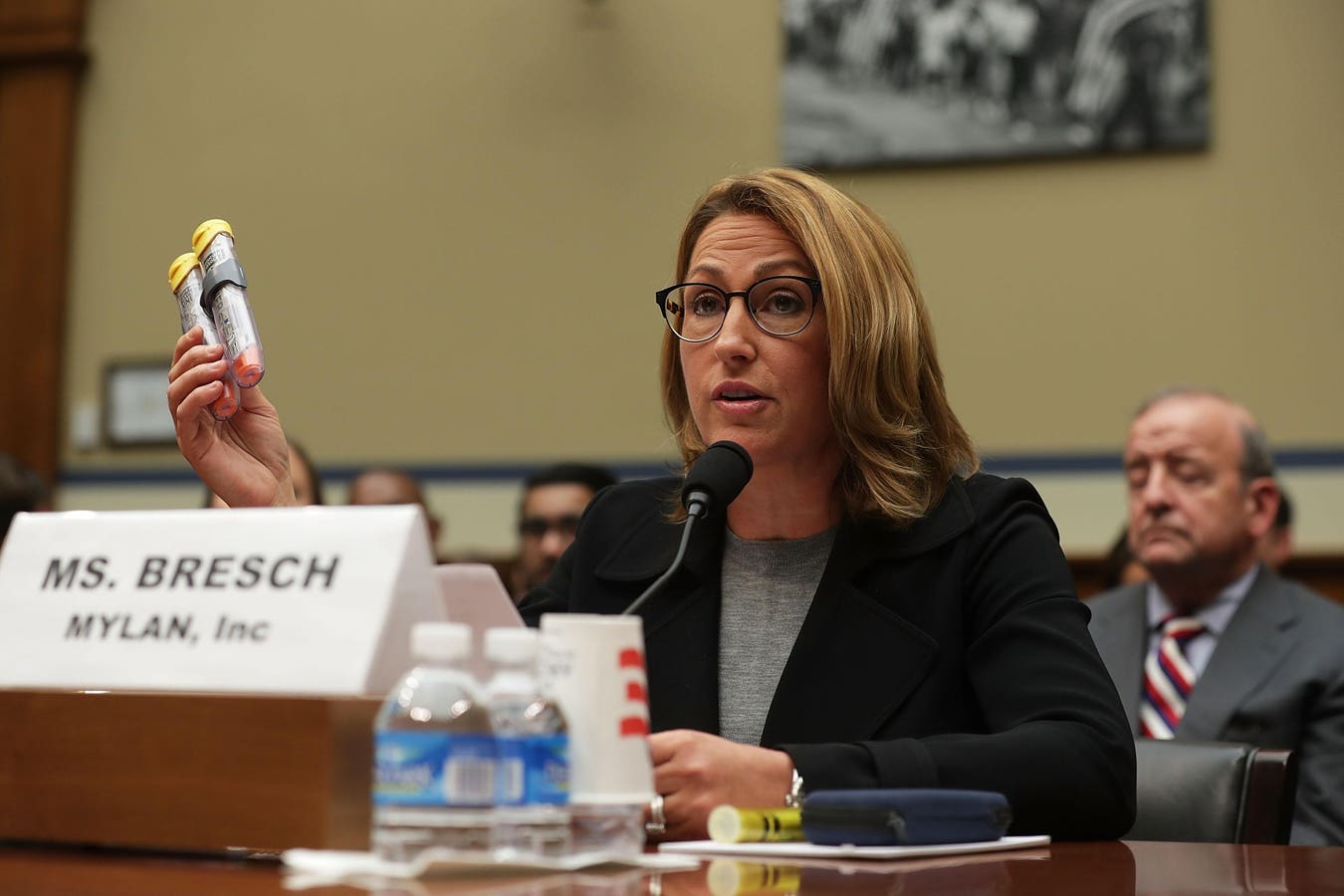
Former Mylan CEO Heather Bresch help up a 2-pack of EpiPen during a Congressional hearing Rising Price of EpiPens.
Getty Images
Most of us started our careers in healthcare with noble intentions. We told ourselves (and others) that we were here “to help people” and that we would “do well by doing good.”
But decades into a career, those lofty ideals often feel distant. Many of find ourselves focused less on service and more on survival: keeping our jobs, pleasing our bosses, or meeting quarterly targets.
Somewhere along the way, we become complicit in behaviors that harm the very people we once aspired to serve.
How does this shift happen?
Ethical Erosion
Ethical erosion describes the gradual wearing away of moral standards. It’s been studied in a number of contexts (see, for example, Zimbardo’s “The Lucifer Effect” on the Stanford Prison Experiment; or Feutdner, Christakis, and Christakis’s study of medical students).
It rarely happens in a single moment of compromise.
Rather, it creeps in over time—through small justifications, muted discomfort, and an acceptance that “this is just how the system works.”
Think of the pharmaceutical executive who shepherds groundbreaking therapies into existence but then prices them out of reach for the people who need them.
Or the nonprofit hospital executive who touts community benefit while green-lighting predatory billing practices that bankrupt families.
Or the managed care leader who markets generous benefits but approves policies that deny care when patients need it most.
Or the healthcare investor who wants to help people through his investments, but supports companies whose business models are focused more on revenue capture than on truly improving care.
Walk into the headquarters of these organizations and you’ll see values statements etched in glass: “Patients First.” “Compassion Always.” “Integrity Above All.” “Whole Person Care.”
And yet, the values in practice often bear little resemblance to the values on the wall.
This disconnect begs a deeper question: how does it happen to so many of us, across so many corners of healthcare?
Cognitive Dissonance
The psychologist Leon Festinger gave us a useful frame. Cognitive dissonance is the discomfort that arises when our actions conflict with our values.
Humans crave consistency, so when we encounter that conflict, we look for ways to resolve it.
We have three main strategies:
We change our beliefs or behaviors.We rationalize or create new justifications.We downplay the significance of the conflict altogether.
It’s the second and third strategies that often lead to ethical erosion. Instead of confronting the uncomfortable truth, we construct narratives that preserve our self-image: “Sure, our billing practices are aggressive, but we provide life-saving care.” Or: “Yes, drug prices are high, but think of the research pipeline they fund.” Or, “Yes, we deny care, but that’s how we make it affordable for more people.”
Over time, we become numb to the contradictions.
We amplify the parts of the story that cast us in a noble light and suppress the parts that don’t.
What starts as a coping mechanism becomes a way of being.
The Slippery Slopes of Justification
These small compromises accumulate. They create slopes so slippery that it becomes impossible to stand still.
This is how an effort to treat untreated pain morphed into a nationwide opioid crisis.
It’s how medical bills became the leading cause of bankruptcy in the United States.
It’s how healthcare spending grew to nearly 20% of GDP while access to care for ordinary Americans grew harder and harder.
Each of these crises wasn’t born of villains twirling their mustaches. They were born of decent people making rationalizations, telling themselves the dissonance didn’t matter, or that someone else was more responsible.
Which brings me to one of the most common refrains I hear in healthcare circles: “The system is broken.”
The “Broken System” Narrative
The phrase is often spoken with resignation, as though it absolves us of responsibility. Payers blame providers. Providers blame pharmaceutical companies. Pharma blames regulators. Everyone blames policymakers. The finger-pointing is endless. Brian W. Powers, Christine K. Cassel, and I wrote about this phenomenon in the pages of JAMA.
But here’s the uncomfortable truth: systems don’t break in a vacuum. They break because of the people who work in them.
And that means each of us—no matter our role—owns a piece of the dysfunction.
Blaming “the system” without acknowledging our own role in its brokenness is itself an act of ethical erosion. It allows us to avoid accountability, to excuse our compromises as inevitable. It’s a convenient story, but not an honest one.
Moments of Clarity
Every so often, though, something pierces through the fog. Psychologists call these “moments of clarity, brief flashes when we see reality as it is, stripped of rationalizations.
For me, these moments have come in unexpected places: listening to a patient explain the financial devastation of a hospital bill; sitting with seniors whose benefits didn’t match their needs; hearing a frontline nurse describe the burnout of being stretched too thin; listening to a new doctor questioning high-risk patient programs that put inexperienced clinicians in front of the sickest patients of the healthcare system.
These moments are jarring because they strip away the stories we tell ourselves. They remind us that our compromises aren’t harmless abstractions. They have consequences. They hurt people.
And yet, too often, these moments of clarity fade. We return to the stories that soothe us. We tell ourselves we don’t have a choice. We accept the dissonance as the price of survival.
A Call to Extend Clarity
But what if we didn’t let these moments fade? What if we extended them—let them reshape our behaviors, not just our feelings? And encouraged them in others.
The antidote to ethical erosion is not another mission statement or corporate value etched in glass. It’s the discipline of holding on to clarity, even when it is uncomfortable.
That means putting ourselves in touch with the real lived experience of people using our products and services every single day.
That means asking harder questions of ourselves and our organizations:
Are our decisions aligned with the values we claim to hold?
What rationalizations are we clinging to that we know, deep down, don’t hold water?
What small compromises today could become tomorrow’s crisis?
Healthcare has no shortage of complexity or competing incentives. But it also has no shortage of people who still want to do the right thing. The challenge is resisting the gradual erosion of those instincts.
Because if ethical erosion happens gradually, so too can ethical renewal.
It begins with clarity, it builds with accountability, and it endures when we commit to living the values we once only wrote on the wall.

